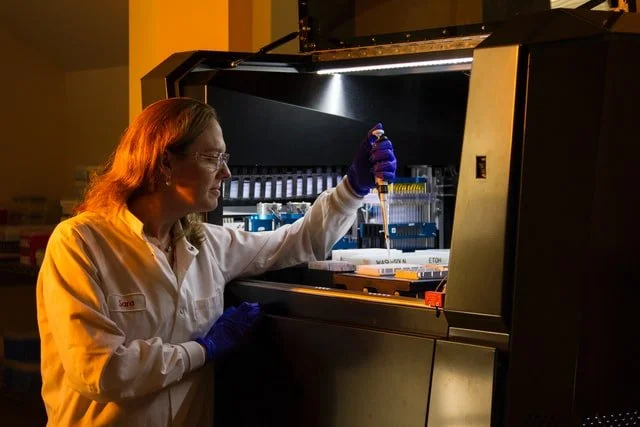Johns Hopkins is a leading university in the world of biomedical research. The Master’s degree in biotechnology will allow future biotech professionals to explore how bio innovations work at every level and from benchtop exploration all way up through regulatory approvals. This rigorous program includes molecular biology, genetics, immunology, cell biology, statistics, and bioinformatics taught by world-class professors with extensive research experience in the life sciences industry.
Johns Hopkins Ranking Worldwide
Johns Hopkins University is noted as one of the best research schools in America for microbiology and biochemistry, with more than 600 million dollars invested each year in scientific inquiry. This allows students studying biotechnology to take advantage of unique research opportunities that are unavailable elsewhere.
Johns Hopkins offers its Master of Science in Biotechnology for both full-time and part-time students. The program provides the scientific foundation needed for an M.D./Ph.D., M.D./MBA, or other postgraduate degrees in biotechnology.
Biotechnology has been around for decades, though it was only called biotechnology in the 1970s. It is a multi-billion dollar business with many applications.
Biotech companies often hire talented people who have specific skills they need but cannot find on their staff. A master’s degree in biotechnology can be a great way to get into the biotech industry. Johns Hopkins University is offering Master’s degrees in biotechnology through its online program.
The program is intended to assist students in developing science, science policy, and business skills, enabling them to pursue careers as researchers and entrepreneurs.
Students who complete the courses will be prepared for jobs as:
The curriculum provides molecular biology and genomics and bioinformatics, manufacturing, regulatory affairs, and intellectual property. Students take courses in those areas, as well as legalities of biotechnology, finance, and entrepreneurship. They also learn about scientific ethics and the social impact of biomedical research.
The program begins with a comprehensive summer session. The summer session includes core courses in life sciences and bioinformatics.
It allows students to meet their fellow students and faculty while learning the structure and practice of the Johns Hopkins graduate school. The remainder of the courses (3-5 per semester) will be taken over two additional semesters.
Students take one course per semester in a sequence of three to five courses. In addition, students choose a fourth course from a list of courses in the life sciences. Special courses include:
The curriculum requires 33 credits total, with at least 18 credits from core courses and 9 credits from science electives.
The electives allow students to pursue a secondary thesis or a study abroad semester. The program ends with a comprehensive exam and oral defense of the final dissertation prospectus.
Many students seek additional training in biotechnology by completing an internship. Johns Hopkins offers opportunities to participate in an industry-sponsored summer internship experience.
Students gain valuable skills and experience during this program, including an internship at a biotechnology company or government agency, academic credit for the work performed, and the opportunity to present their experiences to professional organizations.
Johns Hopkins University Biotechnology Conference
The first annual Biotechnology Conference was held on April 18, 1973, at Johns Hopkins University.
Speakers and panelists included:
The first president of the Biotechnology Institute was Dr. Ray Kammermeier. Dr. Kammermeier was a professor of chemistry and biochemistry at John Hopkins from 1964 to 1987, director of the John Hopkins Hospital from 1976 to 1985, and founding dean of medicine and public health schools from 1986 to 1988. In 1989 he became president of Purdue University, where he stayed for five years before retiring in 1994.
Dr. Kammermeier is a member of the National Academy of Sciences and a recipient of the Lasker Award, an honorary doctorate from Washburn University, and the 1990-91 Alumni Award for Distinguished Achievement from Purdue University.
In addition to Dr. Kammermeier, Biotechnology Institute’sInstitute’s Advisory Board members have been awarded Nobel Prizes in physiology/medicine or chemistry. Others include:
Dr. David P. Dangoor is a professor of biomedical engineering and serves as the director of the Biomedical Engineering Laboratory at Johns Hopkins School of Medicine and Biological Sciences.
He joined the faculty of the institution in 1998. In 1999, he was named the first full-time chair of the Biotechnology Institute. Dr. Dangoor has extensive experience in industries such as biotech, pharmaceuticals, medical devices, and biofuels.
Dr. Dangoor’sDangoor’s research concentrates on biomaterials, tissue engineering, biodegradation, biofilms, and drug delivery.
Over 200 peer-reviewed articles in magazines such as Science Translational Medicine and Nature Materials have been published by him. He was on the Thomson Reuters list of Essential Highly Cited Researchers.
Johns Hopkins University History
Johns Hopkins Institution is a private research university. It was founded by Johns Hopkins in 1876 and named after his grandfather John’sJohn’s family. It is in Baltimore, Maryland.
The university has a total of nine different undergraduate colleges and schools. Some of which include the Whiting School of Engineering, Krieger School of Arts & Sciences, Carey Business School (MBA), Bloomberg School of Public Health (MPH), etc.
The John Hopkins Bloomberg School of Public Health offers a Master in Biotechnology degree offered by the Department of Molecular Microbiology and Immunology.
Students can enroll in the program on campus or online, and full-time or part-time alternatives are available. A lot of classes are held at night to accommodate working professionals who have other commitments during the day.
The Master in Biotechnology program provides students with a strong foundation of biological and biotechnological knowledge, which can be applied across the industry from basic research to product development and pharmaceutical production.
Students will have access to leading faculty members who are experts in their fields and current literature that addresses current issues the biotechnology industry faces.
In addition to taking courses related to biology and biochemistry, students will also be exposed to legal issues pertaining specifically to biotech businesses.
This includes a course in intellectual property rights, an important topic for those who want to open their own business or take on research projects with corporate entities.
This program is ideal for those considering pursuing a career in the biotech industry and established professionals looking to refine their knowledge base or advance into leadership roles.
Biotechnology training can be highly specialized, so students will access professors with expertise that matches their interests.
Students will explore their interests and discover where they fit into the industry as a whole.
Students may have the opportunity to work with faculty members on cutting-edge projects or join one of several prestigious fellowships being offered by Johns Hopkins University.
Johns Hopkins also Master in Biotechnology degree offered by the Department of Molecular Microbiology and Immunology.
Many of their classes are held at night to accommodate busy professionals who have daytime commitments. The program can be on campus or online, with either full-time or part-time enrollment options available for students.
The Master in Biotechnology degree is designed to provide students with a strong foundation of biotechnological knowledge, which can be applied across the industry from basic research to product development and pharmaceutical production.
Students will have access to leading faculty members who are experts in their fields and current literature that addresses current issues the biotechnology industry faces.
Job opportunities for biotechnology graduates:
See compiled list below of the top jobs for biotechnology graduates:* Biotech Sales Representative* Business and Marketing Manager (Biotech)* Lab Technician (Biology, Medical, Pharmaceuticals) * Quality Control Supervisor (Medical Devices) * Bioinformatics Specialist* Technicians in Training or Assisting Laboratory Personnel (Molecular Biology)* Biotechnologist* Medical Secretary for a Clinical Laboratory* Quality Assurance Inspector (Food, Pharmaceuticals) * Lab Services Manager-Biology or Chemistry Labs.* Quality Control Technician* Medical Transcriptionist
In addition to taking courses related to biology and biochemistry, students will also be exposed to legal issues pertaining specifically to biotech businesses. This includes a course in intellectual property rights, an important topic for those who want to start their business or take on research projects with corporate entities.
This program is ideal for those considering pursuing a career in the biotech industry and established professionals looking to refine their knowledge base or advance into leadership roles.
Biotechnology training can be highly specialized, so students will access professors with expertise that matches their interests. Medical researchers may want to focus on developing cures and treatments for cancer. In contrast, others may want to focus on agricultural biotechnology.
* Biotech Sales Representative is one of the top jobs for biotechnology graduates.
* Lab Technician (Biology, Medical, Pharmaceuticals) is one of the top job opportunities for biotech graduates.
* Quality Control Supervisor (Medical Devices) is a popular job among those who have earned a Master in Biotechnology degree from Johns Hopkins University.
* Bioinformatics Specialist is an in-demand job for those who have earned a Masters’s degree from Johns Hopkins University.
* Technicians in Training or Assisting Laboratory Personnel (Molecular Biology) is one of the most popular jobs among grads with a Master’s Degree from Johns Hopkins University.
* Biotechnologist
* Medical Secretary for a Clinical Laboratory is
* Quality Assurance Inspector (Food, Pharmaceuticals) often land on this list as well.
* Lab Services Manager-Biology or Chemistry Labs
In conclusion, a master’s in biotechnology at Johns Hopkins University provides a competitive advantage to graduate students by giving them the knowledge and experience they need to excel in their field.
Check Out Our Latest Post What is a Biorobotics Degree? (The Science & The Machine) – College-My Degree (collegemydegree.com)
Sources MS in Biotechnology – Johns Hopkins Advanced Academic Programs (jhu.edu)




